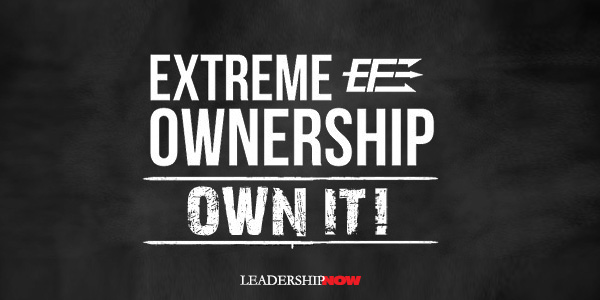 |
 |
10.12.15

Extreme Ownership Extreme Ownership by Navy SEAL officers Jocko Willink and Leif Babin is about leadership as personal responsibility. “Leaders must own everything in their world. There is no one else to blame.”
Extreme Ownership by Navy SEAL officers Jocko Willink and Leif Babin is about leadership as personal responsibility. “Leaders must own everything in their world. There is no one else to blame.”
Willink and Babin bring up some of the critical problems that result from not taking responsibility. Too often we as leaders intend to do the right things, want the organization to do the right things, but do not take the steps necessary to make sure that learning happens and standards of conduct are enforced. When thing do not go as expected a leader must stop and do a “stern self-assessment of how you lead and what you can do better” if you want outcome to be different next time. Too often we skip this step, especially when the incident blows by with little or no consequence. When it comes to what we want from our leaders throughout the organization, “it’s not what you preach, it’s what you tolerate. When setting expectations, no matter what has been said or written, if substandard performance is accepted and no one is held accountable—if there are no consequences—the poor performance becomes the new standard.” This is why we see little change in leadership and organizational culture. “Leadership isn’t one person leading a team. It’s a group of leaders working together, up and down the chain of command, to lead.” It’s critical that everyone is on the same page. Everyone must believe in the mission. If you don’t understand the mission, it is your responsibility to ask questions until you understand how and why the decisions being made are made. Ego is always in the background ready to disrupt anything. “Most of the disruptive issues that arise within any team can be attributed directly to a problem with ego.” What is interesting is when we don’t want to take any responsibility—when preserving our rightness is most important to us—we block others from seeing their responsibility. Instead of a learning experience we create a clash of egos. They write, “If you approached it as he did something wrong, and he needs to fix something, and he is at fault, it becomes a clash of egos and you two will be at odds. That’s human nature. But, if you put your own ego in check, meaning you take the blame, that will allow him to actually see the problem without his vision clouded by ego.” By asserting our rightness we block others from being able to see their responsibility. Willink and Babin provide combat examples and apply them to business situations. “Combat is reflective of life, only amplified and intensified.” They cover four critical concepts that enable a team to perform at the highest level: Cover and Move (to move as one), Simple (keep plans and communications simple), Prioritize and Execute (avoid target fixation on a single issue), and Decentralized Command (leaders at all levels must be empowered to make decisions). Finally they cover Sustaining Victory. Here are some thoughts from that section: One of the most important jobs of any leader is to support your own boss—you immediate leadership. Leaders in any chain of command will not always agree. But at the end of the day, one the debate on a particular course of action is over and the boss has made a decision—even if that decision is one you argued against—you must execute the plan as if it were your own. And this key point: A leader must lead but also be ready to follow. Extreme Ownership is inspiring in many ways but more importantly, it tackles accountability for one’s own actions that is not stressed enough in leadership. We all know but we don’t always do. And when we don’t we need to look at our own contribution. 
Posted by Michael McKinney at 11:19 PM
|
BUILD YOUR KNOWLEDGE
 

How to Do Your Start-Up Right STRAIGHT TALK FOR START-UPS 
Grow Your Leadership Skills NEW AND UPCOMING LEADERSHIP BOOKS 
Leadership Minute BITE-SIZE CONCEPTS YOU CAN CHEW ON 
Classic Leadership Books BOOKS TO READ BEFORE YOU LEAD |